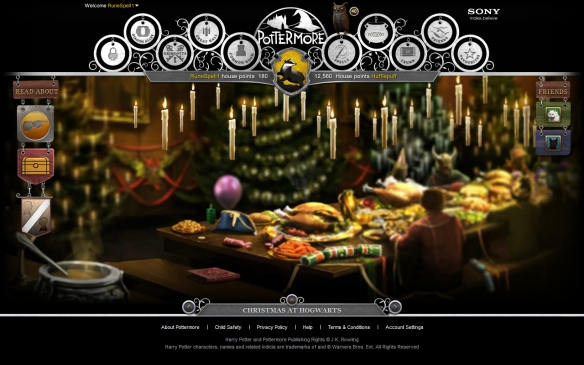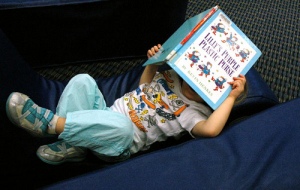Over the last few weeks Pottermore has let in over 144,000 early entry users to the Beta testing site which opens to the public in October. The next month or so will see the full one million Beta testers accepted to the site where they can explore the world of Pottermore, leave feedback and test the site for glitches.
I gained access two weeks ago and wanted to explore the story fully and get used to the interface before writing this blog. J.K Rowling made it clear that Pottermore would be an “online reading experience” rather than an RPG (Role Playing Game) and that rather than taking an active role in the story users would be passive, watching the story of Harry Potter unfold as they work their way through the chapters with extra written content from Rowling herself.
The site is quite user friendly already and it certainly is more of a reading experience than an action game. As a user you are given a persona which you develop and discover as you progress through the story (I’ve become quite attached to my ‘Quill Queen’ character). Currently users only have access to the first book, The Philosopher’s Stone. You are a student in the same year as Harry, Ron and Hermione and whilst you go through the motions of purchasing items from Diagon Alley, having a wand choose you and being sorted into a house you aren’t directly involved in the action of the story: you are a voyeur, a reader.
The story is split into chapters, just like the book, and each chapter has up to three key ‘moments’ to explore. The ‘moments’ consist of mainly static images which the user can zoom in to and can collect and discover items through a point-and-click system – within the ‘moments’ you can access content which is in the book and new content from Rowling which can range from information on wizarding fashion through to the personal history of Minerva McGonagall, Head of Gryffindor. It is suggested at the start of the story that Pottermore be explored whilst reading the book; a good idea if one is unfamiliar with the story and, in my opinion, a charming idea for exploring the story with a child (after reading a chapter of the book the child can experience the key moments for themselves online).

The artwork used is very sympathetic to the style of both the films and the cover artwork for the books and wisely never shows the faces of the characters. It’s almost a blurred snapshot of one’s own imagination while reading the book, a clever move to avoid disappointing diehard fans. Despite the user’s passivity within the storyline (which, of course, cannot be altered through play) you are given a chance to become involved in student life. You are sorted into a house by answering a series of questions (the questions are rather unobvious therefore you cannot answer just to be sorted into your preferred house– I always believed with my love of study I would be a Ravenclaw; it turns out I’m an ambitious Slytherin!) and once in a house you can start earning points by collecting items, brewing potions and (once it’s working) duelling against other houses.
Although marketed as a ‘reading experience’ many fans are leaving feedback asking for more action, many suggesting a soundtrack or sound effects to accompany the ‘moments’ with some fans even wanting movie clips. Most feedback asks for more ways to earn points by perhaps playing Wizard’s chess, Quidditch or Gobstones. I feel that movie clips would demean the idea of the site; if I want to watch the films I will do just that! But sound effects, perhaps of Fluffy (the three headed dog) growling or the Hogwarts Express chugging along the train tracks, would add to the atmosphere created by the beautiful artwork and further ways to earn house points could add another element of interactivity to a quite passive online experience. However I believe that Sony haven’t done a bad job – they’ve delivered what they set out to and we won’t be able to judge the site fully until the full version is released in October.
I blogged in June that I thought Pottermore would inform the future of online reading yet I am now unsure. The model seems to work with the world of Harry Potter, a world which transcends both book and film, but would it work with other texts, even those with similar franchises (Twilight…?). I am unsure that there will ever be anything which matches the personal and emotional experience of reading a bloomin’ good book.

Words, words, words by Frankie Jones is licensed under a Creative Commons Attribution-NonCommercial-NoDerivs 3.0 Unported License.
 This week my gentleman and I have gone vegetarian. It’s not unusual for me to have a veggie meal every now and then but we wanted to try a whole week having different vegetarian meals, no Quorn or meat substitutes, to see how it goes. The shop was certainly cheaper and three days in I’m enjoying it and have discovered that vegetarian meals can be as (or perhaps more) varied than the traditional meat and two veg.
This week my gentleman and I have gone vegetarian. It’s not unusual for me to have a veggie meal every now and then but we wanted to try a whole week having different vegetarian meals, no Quorn or meat substitutes, to see how it goes. The shop was certainly cheaper and three days in I’m enjoying it and have discovered that vegetarian meals can be as (or perhaps more) varied than the traditional meat and two veg.



